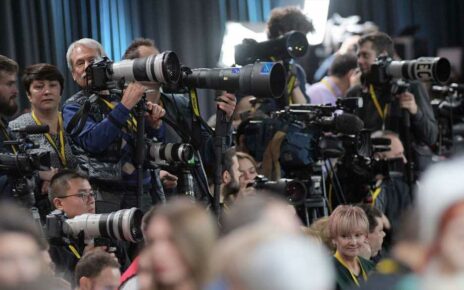

Courtney Barnett stands alone in the middle of a recording studio in Oslo. A dressing room in Bloomington. A rooftop in Berlin. On stage, the Australian singer-songwriter commands attention, her propulsive energy and raspy croon animating everyone in the room as she bares her soul with songs like “I’m Not Your Mother, I’m Not Your Bitch.” It’s these in-between moments, however, that speak to Barnett’s genuine nature — a shy, oftentimes sad human being who leads a solitary life, and has difficulty opening up anywhere but in her lyrics.
All of these qualities and more are captured on striking 16mm in “Anonymous Club,” the first feature from music video director Danny Cohen. A frequent collaborator of Barnett, Cohen developed a friendship with the singer that inspired him to try his hand at documentary filmmaking. Familiar with her reticence as an interview subject, Cohen asked her to speak her mind into a dictaphone during a three-year period, much of it spent on an international tour. The film places these stream-of-consciousness half-thoughts, at once mundane and profound, but always sincere, over footage of the singer on the road and on stage, at home in Melbourne and in hotel rooms around the world, adding up to a unique, vivid picture of the Barnett’s inner and outer worlds.
The moment-by-moment rhythm of Cohen’s film is less interested in backstory than in trying to capture Barnett’s shifting moods at this point in her life. While Barnett is an internationally renowned, Grammy-nominated artist, she’s secretly simmering with self-doubt, as she reveals on tape, constantly questioning herself and her work. She languidly ruminates on the purpose of her music, and of the entertainment industry in general, taking her time to try and put her ambivalent thoughts into words.
When it comes to live performance, she says, “Some days it can be so liberating and electric and energetic and alive.” While others, “It feels like i”m being part of this scripted performance … and it just feels really pointless.” Meanwhile, when a crowd has low energy, she wonders if everyone “thinks I’m a big joke and talentless.”
These deeply personal observations end up feeling like acts of generosity, much like Barnett’s music. It’s as if she’s reaching out to viewers and listeners, reassuring them that, as she sings on the cleverly titled “Hopefulessness,” “Your vulnerability / is stronger than it seems. You know it’s OK / to have a bad day.” Barnett is, like most of us, a bundle of conflicting emotions and impulses, at one moment drained of inspiration and excitement for the future, at another full of life and creative energy. But her attitude through it all makes her an endlessly enjoyable subject to watch — self-indulgent but always self-aware and quietly curious, her smile and bright green eyes ever-present as she makes her way through the world.
The film, taking a cue from Barnett’s relaxed cadence, takes its time too, lingering on quiet moments long enough to let us feel connected to them before whisking us away to another locale. Cohen’s decision to shoot on a 16mm camera (that was specially customized to sync sound) lends these moments an even greater intimacy. At one point Barnett sits in a hotel room in an unnamed city, strumming her guitar in a blue kimono. The pale lilac furniture and curtains give the scene a washed out, hazy feel, as she almost whispers the lyrics she’s workshopping.
Another method might have felt harsh and invasive, but 16mm gives each sequence a warm, inviting glow, capturing the soft hues of each setting with a sense of emotional honesty. The unpolished, textured feel of the film feels like a good match for Barnett as well, whose voice, slightly gravelly with a gentle Aussie twang, is not unlike the heartfelt, ravaged sound of Lucinda Williams (unsurprisingly, one of Barnett’s favorites).
Barnett makes the decision to organize her first solo tour without her backing band, as a way to reimagine her music, hear the songs in a new way, and ultimately understand them differently. It feels like a risky move from a musician plagued by “crippling self-doubt and a general lack of confidence,” to steal the title from one of her songs. As she nervously prepares for her first tour stop in Bloomington, Indiana, she wonders if anyone really wants to hear her play.
At this point in the film, Barnett is speaking right to Cohen behind the camera, delivering her thoughts in real time. “I mean everyone’s bought a ticket, right,” Cohen says. “Yeah,” Barnett responds. “Unless they got a free ticket,” she chuckles, before going into a list of reasons why people might not want to be there, including being “re-gifted” someone’s rejected Christmas gift or having “hate-bought” a spot.
But as she steps on stage and starts to play, all of the nerves appear to dissipate. “We love you Courtney!” rings out from the audience. “I…love…you…too!,” she says back. She opens with Hank Williams’ “I’m So Lonesome I Could Cry,” a devastating tune on its own, but which carries with it some extra weight after witnessing Barnett’s struggle with insecurity through the film’s first half. Her voice soars, lilts and wavers in a moment of piercing, admirable vulnerability on stage.
At her next stop, she opens up to Cohen. “I’ve gone from like, a big darkness to this quite open optimism.” Playing solo and connecting with the anonymous crowd through her music seems to have helped solidify what her purpose is — “to give someone in the audience the energy and the power to feel something.”
“Anonymous Club” is undoubtedly a film that Barnett fans will adore — but if you’re not familiar with her music, or perhaps not that into it, you may emerge a fan by the end. Or at least a fan of Cohen, who, through his sensitive lens, reminds us that the music of the best singer-songwriters is inspired by their own feelings — of joy, or sorrow, love or solitude — and can transcend the boundaries between the crowd and the person singing it. Sometimes, it can even help us feel less alone.
Grade: A-
Oscilloscope will release “Anonymous Club” in theaters on Friday, July 15.
Source: Read Full Article


